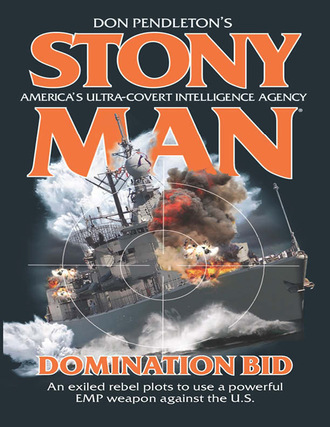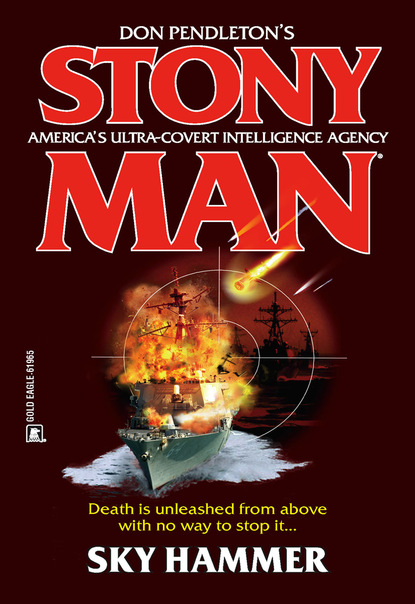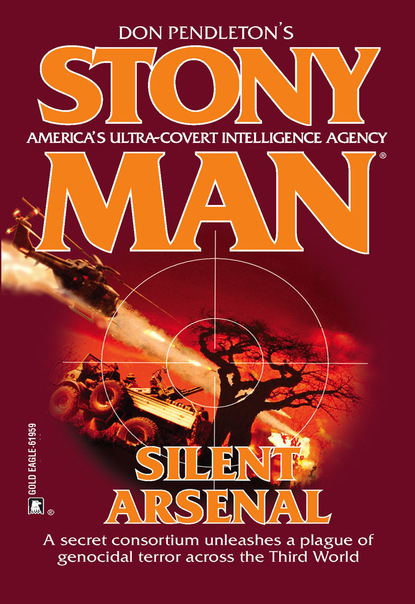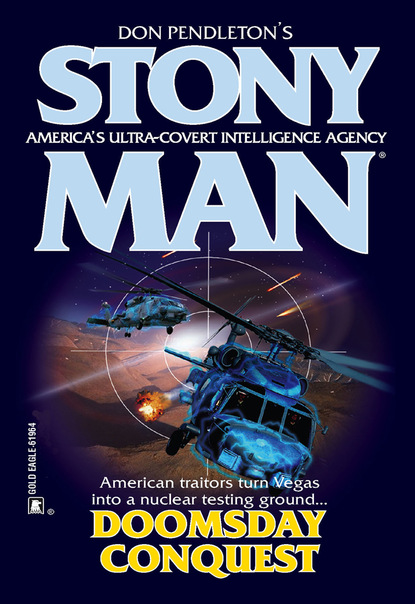
Полная версия
Domination Bid
“And how could you know this? Even if it’s true, it wouldn’t make any sense. Stalling progress of my research is hardly in their best interests.”
“Not when it comes to certain parties that may not be known to you—parties that have the direct confidences of your president. You see, there are conservative elements within your government that have been attempting to persuade investors buildup of conventional armament is the key to restoring Russian military superiority. They see technical advancements as merely fodder to be stolen by others and used against them. This is why they’ve done everything in their power to slow the manufacture of your prototypes.”
Dratshev shook his head. “Then why go to such great lengths to protect me? Why not simply kill me?”
“I do not have the answer to that question, although I have frequently considered it.” Madari gestured at him. “However, I think you are sufficiently intelligent enough that you have pondered this point yourself, and most likely formulated your own answer.”
Dratshev had, in fact, and it was something he’d dared never utter for fear it might become a reality. Those inside the government who preferred conventional military might would never have risked assassination for fear of alienating those holding the power of the purse. What impressed Dratshev, however, was Madari’s refusal to conjure some story in answer to Dratshev’s question. Madari’s simple acknowledgment of ignorance demonstrated a rare and unusual sense of honesty. Dratshev had to admit he actually found that refreshing.
“This is all interesting,” Dratshev said, “but it still doesn’t drill down to the reason you’ve gone to these lengths.”
Madari smiled and then stood. “I believe it would be wiser to wait until you are more lucid to engage in such a conversation. All in good time, Dr. Dratshev.”
Madari whirled on his heel and as he headed for the door he added, “In the meantime, please consider yourself a guest and, should you need anything, perhaps food or a blanket, my assistant will be happy to get it for you. You should take every opportunity afforded you on this point. We’re still six hours from our destination.”
When Madari was gone, Dratshev took time to inspect his bonds. As he’d suspected, the restraints circling his wrists were thick leather fastened by chains. Escaping such bonds would be impossible. He looked at his legs and noted they were also secured in like fashion.
Finally, Dratshev laid his head back and closed his eyes. Best to get as much sleep as possible and wait for a more opportune time to make his escape.
Sooner or later, he knew such a solution would present itself. It always did when one exercised patience.
* * *
ELEVEN MEN WAITED as their leader studied the facility through a night-vision scope. To local residents, it appeared to be nothing more than what it was advertised: a research center run by the department of agriculture.
Colonel Jack Cyrus knew it to be otherwise, which was why he and his team were in rural Iowa.
Cyrus lowered the scope and passed it to his second-in-command, Riley Braden. “Interesting. The security appears to be minimal.”
Braden took the scope and performed his own inspection. “I agree, sir.”
Cyrus tried not to wince at the “sir” despite the fact he understood it. It was protocol but difficult to hear coming from a man that had not only been his peer throughout their respective military careers, but also his friend since high school. In private, they addressed each other by name but out here in the field they had to set an example and chain of command in front of the others.
Braden continued. “Ten-foot fence with cyclone wire. No visible sentries, so probably armed security inside.”
“Rent-a-cops, at best,” Cyrus replied.
“And probably not that many.”
“Intelligence says they walk rounds with e-point checks at regular intervals. That means they can’t cover the whole area at one time.”
“I’d concur with that assessment,” Braden agreed. “What’s your plan?”
“We have to assume a facility of that size will have full video-and audio-camera surveillance.” Cyrus turned to Braden. “I see a training opportunity here, Major. What do you think is the best course of action?”
Braden didn’t hesitate in his reply. “Two teams. Breach the northeast corner of the perimeter fence. First team will locate the power sources and neutralize them, including generators. Second team makes entry to the building and then sends two to retrieve the data while the rest deal with any human elements. Outer team will provide perimeter and egress security, as well as mission failsafe.”
Cyrus nodded, impressed with his friend and colleague. “Excellent tactical plan, Major Braden. Exactly what I would’ve done. I’d say the decision’s been made.”
“Thank you, Colonel.”
“You’ll lead the inside team.”
Braden looked surprised. “I don’t know the job.”
“You know it as well as I do.”
“Yes, sir, but I was trained to do it only in the event you could not.”
“Nonsense. There’s no difference.”
“Sir, with all due respect, I strongly suggest you reconsider.”
Cyrus didn’t look at Braden as he responded in short fashion, “I already have, Major. It’s not a request. You will lead the primary team and you will accomplish the mission objectives as they’ve been given to us. Understood?”
“Yes, sir.”
“Then let’s move out.”
Braden nodded and turned to the team members he would now be leading on the mission. As he briefed them on the change in plans, Cyrus sighed. He’d considered sticking to the original mission parameters but he wanted his friend to take credit for what he knew would be another success. Their employer, who’d expressed reservations about bringing Riley Braden into the fold from the beginning, had to know that Braden had as much command ability and skill as Cyrus. This would be Braden’s chance to prove it without even being aware Cyrus was putting him to the test. Cyrus had learned long ago one mark of a good leader was to set up those in his command to succeed whenever possible. Not only did it boost morale but it also instilled confidence in self—not to mention what it did for unit cohesion.
The teams automatically performed a last check of equipment and then broke into approach formation. Every man knew what to do, where to stage in relationship to every other man, and what their individual responsibilities. They’d trained for this dozens of times until they’d had it down like clockwork.
The exterior team arrived first and two men went to work on the fence, cutting links with the marked precision of professionals. Cyrus knew they’d practiced, but his chest swelled with pride as he watched them in action. Within thirty seconds they’d made the ingress.
With a nod from Cyrus, Braden gestured to his team and they moved through the hold. The two squad weapons men took point and then Braden. The remaining trio proceeded after him. They moved across the field at a breakneck clip and located the power boxes stationed on the exterior of the main building.
Braden knelt and flicked his thumb twice at two of his team members. The demo guys went to work on the boxes, priming them with the charges. Braden risked a glance over his shoulder and saw Cyrus making his way through the fence in the same way Braden’s team had just a minute earlier.
Once the charges were set, Braden and his men broke from their positions and headed toward the rear door where they’d planned to make their entry. They were nearly there when the charges blew the power boxes apart. Every interior light in the building went out, as well as power to a small external building. One of the men blew the lock off the door with a small roll of self-detonating plastic explosive and within seconds Braden’s team had gained access.
“You have five minutes.” Cyrus’s voice resounded in Braden’s headset. “Mark T-minus five, starting now. Radio silence from this point.”
“Copy,” Braden replied.
The six men pushed up the darkened corridor, moving smoothly as one unit. They followed a standard fire-and-maneuver pattern, leap-frogging in pairs as they approached their objective.
They reached the data room unmolested and Braden gestured for four of his men to fan out while the other would provide cover while he made his entry. The door proved no match for the pencil detonator that shot the bolt lock inward as if it had been fired from a potato gun. Braden eased the door open and snatched the red-lens flashlight from his equipment harness.
He managed to get about three feet inside before bullets crashed into the chest of his comrade and drove the man into the door frame. Braden wondered how he managed to avoid a similar fate even as he threw himself the floor and a fresh volley burned the air where he’d stood a millisecond earlier.
Braden brought his Steyr Aug Para into play and triggered a burst in the direction of the muzzle-flashes. The rounds bounced off a solid object marked by the sparks from their impact. It took Braden a moment to realize that he’d been firing into bulletproof glass.
Braden rolled onto his back and yanked an HE grenade from his harness. He primed the hand bomb and tossed it overhead before jumping to his feet and rushing toward the door. He threw himself around the corner and landed on his belly just as the grenade blew. Red, yellow and orange flame whooshed through the open door.
“We’re blown!” he shouted at his men. “Retreat!”
None of them had to be told twice, two taking point and two more providing rear cover with Braden between them. The men dashed up the hallway at full sprint and exited the building in time to see a firefight had already ensued between Cyrus and his team.
Braden and his men spread out and engaged whatever targets presented. The air came alive with reports from dozens of automatic weapons on both sides. To the observer it would’ve seemed as if a small war had erupted in the USDA’s “research facility” and it would’ve been a bizarre sight, at best.
Braden managed to rendezvous with Cyrus, miraculously avoiding death in the process.
“What happened?” Cyrus demanded during a lull in the shooting.
“Ambush,” Braden replied as he sighted on an enemy gunner and squeezed the trigger. “They were waiting for us.”
“Blown immediately? From the start?”
“It would seem so,” Braden said through clenched teeth as he fired at another target, missing by a narrow margin.
“You’ve ordered a retreat?”
Braden nodded.
“We can’t stay here,” Cyrus said.
“You mean you want to leave them?”
“They have their orders.”‘
“Sir, we have to—”
“Do it, Major. Just do it!”
Braden didn’t hesitate, knowing orders were orders. He and Cyrus scrambled to their feet and fired a few extra short bursts to help cover their escape through the perimeter fence. They had a vehicle waiting in the woods, a late-model custom van. It was obvious they’d been expected, so the success of their getaway was by no means guaranteed. But one thing Cyrus and Braden agreed on as they made their way to the van, there would be a day of reckoning.
There would be payback and it would be a revenge of the sweetest kind.
CHAPTER THREE
Stony Man Farm, Virginia
The five battle-hardened warriors of Phoenix Force sat attentively as Harold Brognola, head of the most covert special operations agency in America, opened the briefing.
“We’re long on intelligence and short on time, so let’s get right to it,” Brognola said. He looked at Barbara Price and nodded.
Price, Stony Man’s mission controller, tapped the key on the table-top keyboard in front of her and the operations center conference room lights dimmed. A moment later the face of a young man with dirty-blond hair appeared on the 72-inch LED screen at one end of the room.
“Gentlemen, meet Dr. Oleg Dratshev. This picture was taken about ten years ago when he was age twenty-five. For more than a decade Dratshev has been Russia’s foremost military R and D scientist in the areas of electromagnetic pulse weapons. He holds several advanced degrees and his work has been financed directly by the Kremlin. Two days ago he disappeared.”
Price paused for effect and met the gaze of every Phoenix Force warrior before she continued. “Dr. Dratshev is highly respected by most members of the military scientific community. His security was handled by the FSB. He was taken by a party or parties unknown, and thus far no ransom demand has been made. The Russian government has attempted to keep his disappearance a secret, but it was hardly possible given that he disappeared shortly after arriving in Minsk and the grabbers left the bodies of four FSB agents behind.”
Phoenix Force’s team leader, David McCarter, cleared his throat and asked, “Do we know why he was in Minsk?”
Price shook her head. “We don’t have any positive proof but we believe he may have been there to oversee the test demonstration of some prototype weaponry he designed.”
Calvin James let out a low whistle. “Funny they’d think testing weapons of that size in a foreign territory would be something they could keep a lid on.”
“Well, the buzz running through the highest channels at both the CIA and NSA would indicate they weren’t testing high-energy weapons,” Price replied.
“Wait a minute,” Gary Manning interjected. “Are you saying Dratshev has come up with a design for EMP application using small arms?”
“It would seem so,” Price replied.
Each of the Phoenix Force members muttered curses under their breath and an icy tension settled on all present.
“That’s unthinkable,” Rafael Encizo said. A Cuban native and one of the original Phoenix Force veterans, Encizo was the team’s resident specialist in maritime operations and an expert knife fighter.
“As far as we know,” Price said, “the capabilities of EMP in small arms are still little more than an untested theory. But we do think that given how long Dratshev’s been working on the project, coupled with the Russian government’s continued financing of his research, those capabilities are a very real possibility.”
“Excuse me,” Thomas Jackson Hawkins said, raising a hand in automatic reflex.
“T.J.?” Price acknowledged with a nod.
“I was under the impression EMP was still somewhat poorly understood. At least from the perspective of safe weaponization.”
“I think Bear could give us a more expert opinion on that concept,” Brognola said. “Aaron?”
The other man in the room differed more than the rest in just the fact that he was confined to a wheelchair. By any standards Aaron Kurtzman had an IQ nearly off the charts and the uncanny ability to collect, sort and manipulate copious amounts of electronic data into logical chunks of intelligence. Those talents, coupled with his leadership of all of Stony Man’s computer-based operations, had saved the lives of every field team member on occasions almost too numerous to quantify.
Kurtzman grinned, happy as always to be in his element. “From the standpoint of physics, electromagnetics is a relatively simple principle to grasp. Think about the Earth. Surrounding our atmosphere is an electromagnetic field, which is generated by the Earth’s core of molten metal spinning at thousands of miles per hour. At least that’s the generally accepted scientific axiom.
“That field helps contain our air and moisture, but more importantly it protects us from the cosmic radiation generated by the sun. Now suppose that you could harness such a field on a microcosmic level and confine it into a narrow beam, a particle beam of sorts. By creating the initial energy and then liberating said energy, a pulse is formed that has all the magnetic force behind it with one distinct difference—it can be focused at a single point.”
“Sounds more like you’re talking about a laser,” McCarter remarked. The fox-faced Briton furrowed his brow. “Is there a difference?”
“Big difference,” Kurtzman replied. “A laser beam has to be intensely focused and remain constant to weaponize it. This requires an intense amount of sustained energy. That’s where we draw the line between science and science fiction. But with an EMP, the energy is already contained within the pulse. It then becomes merely a matter of focusing it.”
“But wouldn’t the same principle apply?” James asked. “I mean…wouldn’t it take as much energy to build up an electromagnetic charge as a laser beam?”
Kurtzman shook his head. “Not according to what Dr. Dratshev’s many years of research has revealed. Somehow, Dratshev has discovered a way to generate that energy at the atomic or even subatomic level.”
“Or at least that’s what our intelligence agencies have surmised,” Price said.
“Unfortunately we don’t have the time to give you a full physics lesson right now,” Brognola cut in. “The important thing to know is that Dratshev has found some way of doing it, and now he’s fallen into the hands of someone willing to go to great lengths to possess that knowledge. Someone we deem to be extremely dangerous.”
“But how can we know they’re dangerous with any certainty?” Hawkins asked.
It was Gary Manning, former member of the RCMP and a self-taught expert on nearly every terrorist organization in the world, who answered. “Because anyone bold enough to go up against the Russian government and, in particular the FSB, is just plain crazy.”
“Or fanatical, at least,” McCarter added.
“In any case,” Price said, “we have to assume the worst. Dratshev’s abduction must be deemed a direct threat against the United States and her allies until otherwise verified. That’s why we’ve activated Phoenix Force.”
“And Able Team,” Brognola added.
“We’re going to work together on this one?” James inquired.
“Not exactly,” Price said. “Not too long after we received the news of Dratshev’s disappearance, an incident occurred at a U.S. Department of Agriculture research facility in a rural area north of Des Moines, Iowa.”
“Uh-oh,” McCarter said. “If memory serves, Barb, isn’t that—?”
“Yes, it’s a data backup warehouse for a special sector of international satellite operations overseen by the NSA.”
James looked at McCarter in amazement. “How the hell did you know that?”
McCarter shrugged. “I read the classified CERN bulletins.”
Hawkins chuckled. “The European Organization for Nuclear Research bulletins? What a nerd.”
“Don’t forget mission controller’s pet,” Encizo added.
“Moving right along to the incident?” Brognola prompted
“Go ahead, Barb,” Manning said. “I’m listening.”
Price smiled. “An armed force of about a dozen men breached the USDA facility and was engaged by security personnel. A number of men were killed on both sides, and about half of this mysterious team managed to escape. Unfortunately there were no survivors to question.”
“Any idea who they were working for?” James asked.
“No,” Price said, shaking her head. “All of the deceased were American citizens with military experience, however. So we’re thinking some sort of mercenary group.”
Brognola said, “The NSA apparently got wind something like this might take place and so they beefed up security just in case there was something to it. Turns out they were right.”
“Then they must have some idea what this team was after,” McCarter said. “Breaking into a bloody NSA data facility is a risky op. The stakes had to be high.”
“We won’t know for sure until Able Team can get there and start an investigation of its own,” Price replied. “What’s interesting about this attack, though, is that the particular data sets stored there by the NSA include covert operations in Belarus and a number of surrounding countries.”
“Which is where Dratshev disappeared,” Hawkins concluded.
“Right,” Brognola said.
Price added, “That’s why we think the two incidents are connected, and thus far the intelligence we’ve gathered would seem to support that theory.”
“What we don’t understand yet is what domestic interest would launch an operation on U.S. soil and why,” Brognola pointed out.
“Well, it sure wasn’t whoever snatched Dratshev,” Encizo replied. “That wouldn’t make any sense.”
“Unless they were trying to divert our attention.”
McCarter shook his head. “I’d have a lot of trouble buying that, Hal. First, it would imply that our own people snatched Dratshev. Second, it wouldn’t make sense to put good resources as such risk for the purpose of creating a smoke screen.”
“That would be an expensive diversion,” Price conceded with a nod.
“And we’re not dealing with idiots or amateurs in any case,” Manning remarked. “That much is obvious.”
Price said, “Well, we figure Able Team will be able to tell us something soon enough. Meanwhile, we’re sending you to Belarus. You’ll pick up whatever clues you can.”
“Are we sure that’s the best place to start?” McCarter asked.
Price nodded. “We have a CIA contact there who’s been shadowing the FSB team sent to retrieve Dratshev when he contacted his handler and reported he’d been compromised. An insider told our contact there was a significant delay notifying the backup team.”
“So this was an inside job,” Hawkins observed in his typical Texas drawl.
“It would seem so.”
McCarter scratched his jaw in consideration. “Any possibility the Russians staged this whole thing?”
“It’s always possible,” Price said with a shrug. “But to what end?”
“Maybe they wanted to throw everyone off Dratshev’s trail? Think about it. They fake his abduction and then everybody starts looking for him in all but the obvious place. His own backyard.”
“We posed that as a potential scenario to our CIA contact and he didn’t think it was likely,” Brognola said. “He’s convinced the kidnapping is real and the threat is viable, mostly due to the amount of scrambling the FSB’s doing. They’ve apparently crawled under every rock and into every crevice of the city.”
“Okay, then I guess it’s off to Minsk we go,” McCarter said.
“If there’s any more intelligence that comes our way while you’re en route,” Price said, “we can always divert you.”
The five warriors nodded in concert.
“Good luck, men,” Harold Brognola added.
* * *
CARL LYONS WAS enjoying an icy swim through a Mississippi tributary in northern Minnesota when the waterproof GPS device around his wrist sent a very mild tingle along his skin.
Lyons pushed his body against the strong current, his muscular arms and shoulders propelling him through choppy waters that would have bested a lesser man. This was just one of the many feats that had earned Lyons his Ironman nickname.
Lyons reached shore and climbed from the water onto the trunk of a fallen tree. He swung his legs over it and planted his feet on terra firma. Beads of water dribbled from every part of skin that had taken on a golden-bronze tone under three days of the early summer sun.
Lyons checked the device as it signaled him again and then set off into a half-mile trot until he reached the spot where he’d left his two companions. He found them both fast asleep, a rock pit smoldering with red-orange wood coals the only remainder of the campfire they’d started the night before.
Lyons put his hands on his hips and shook his head. “Pathetic.” He then walked over and kicked the soles of their feet.
The first man, husky and muscular with gray-white hair, awoke with a start. “What’s the big idea, Ironman?” Rosario “Politician” Blancanales demanded. “That’s no way to wake up a friend.”
The other man had barely stirred, although that hardly fooled Lyons. He knew that both of them were trained well enough they’d probably detected his approach while he was still out of sight. Those same instincts, forged from years of combat and training, were the ones that had registered Lyons as an entity that didn’t pose any threat.
Hermann “Gadgets” Schwarz yawned. “Yeah. Really, Ironman, you have no class.”












